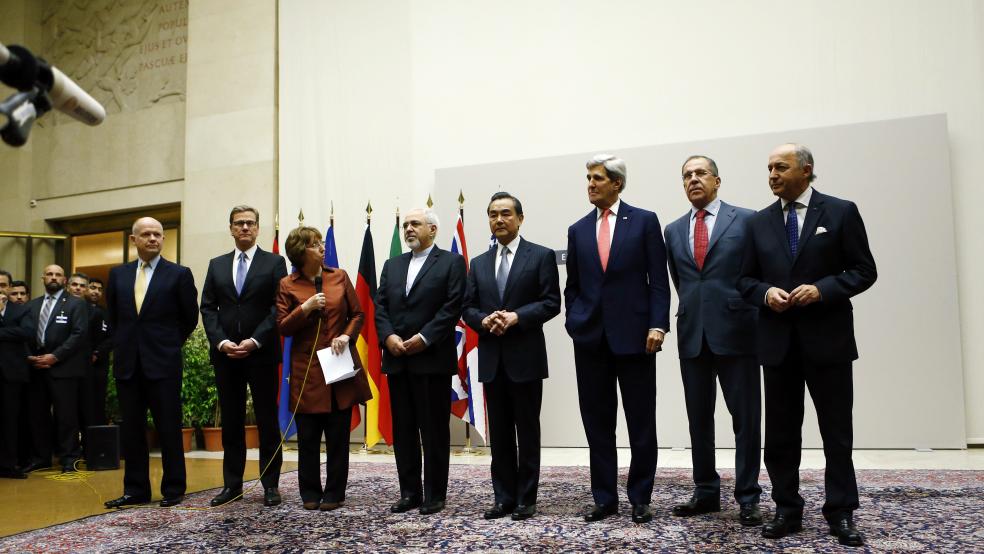Late last night, Secretary of State John Kerry announced the United States and its allies had struck an historic deal with Iran to freeze key parts of Iran’s nuclear program in exchange for relief on economic sanctions that have crippled the Iranian economy.
By Sunday morning, however, that deal was under attack from all sides.
Republicans, both through written statements and appearances on the Sunday morning talk shows, called the deal soft. They said it did not require Iran to dismantle its nuclear infrastructure, which could be used by Tehran to restart its nuclear program in the future.
"Until they do that [deconstruct nuclear infrastructure], they’re still on the road to having the capability for undetectable nuclear weapons break out," Rep. Ed Royce (R-Calif.), chairman of the House Foreign Affairs Committee, said on CNN's State of the Union. "And that’s the bottom line: We just feel more pressure needs to be brought on Iran, rather than to make this deal and take the pressure off.”
Royce’s voice was just one of a chorus of Republican dissenters who said the deal was too lenient. House Speaker John Boehner (R-Ohio), House Majority Leader Eric I. Cantor (R-Va.), House Armed Services Committee Chairman Howard "Buck" McKeon, and Rep. Peter King (R-N.Y.), a member of the House Homeland Security and Intelligence committees all said they were skeptical of the deal.
Even some Democrats blasted the deal. Sen. Charles E. Schumer (D-N.Y., the third-ranking Senate Democrat in the upper chamber, said that the deal did not go far enough.
"Iran simply freezes its nuclear capabilities while we reduce the sanctions. It was strong sanctions, not the goodness of the hearts of the Iranian leaders, that brought Iran to the table, and any reduction relieves the psychological pressure of future sanctions and gives them hope that they will be able to gain nuclear weapon capability while further sanctions are reduced," Schumer said. "A fairer agreement would have coupled a reduction in sanctions with a proportionate reduction in Iranian nuclear capability."
Israel, a key U.S. ally in the Middle East who was not involved in negotiations, also denounced the deal. Israeli Prime Minister Benjamin Netanyahu called it an “historic mistake.”
"Today the world has become a much more dangerous place because the most dangerous regime in the world has taken a significant step toward attaining the most dangerous weapon in the world," he said. He then added, ominously, "Israel will not allow Iran to develop a military nuclear capability."
White House officials said that President Obama planned to speak with Netanyahu today to address his concerns. Kerry publicly defended the deal, saying that Iran would suffer consequences if it did not abide by its terms.
"We have no illusions. We don’t do this on the basis of somebody’s statements to you. We do it on the basis on actions that can be verified," Kerry said on CNN. "
Kerry also said that the deal does not acknowledge Iran's right to enrich uranium. Tehran had insisted that the deal acknowledged its right to enrich uranium for peaceful purposes.
"There is no inherent right to enrich,” Kerry said on ABC’s This Week. “And everywhere in this particular agreement it states that they could only do that by mutual agreement, and nothing is agreed on until everything is agreed on."
Meanwhile, while many in Congress and some American allies condemn the deal, Iranian leaders are celebrating it as a victory of diplomacy.
"Trust is, of course, a two-way street, and we must also find this trust in others. The first step in creating that trust has been taken,” Iranian President Hassan Rouhani said in a statement broadcasted on Iranian television Sunday.
Rouhani also challenged the notion that the deal prohibits uranium enrichment.
"Let anyone make his own reading, but this right is clearly stated in the text of the agreement that Iran can continue its enrichment, and I announce to our people that our enrichment activities will continue as before," he said.
Top Reads from The Fiscal Times
*Obama's Security Deal Gives Karzai a Blank Check





